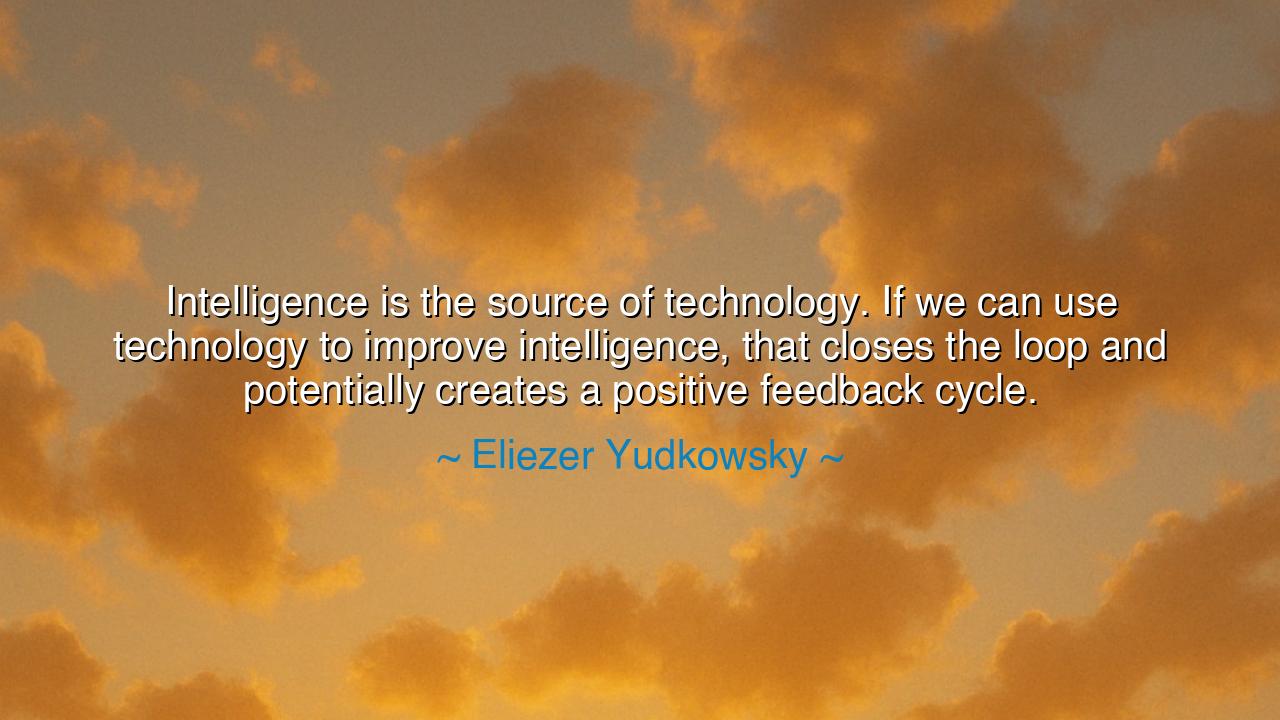
Intelligence is the source of technology. If we can use
Intelligence is the source of technology. If we can use technology to improve intelligence, that closes the loop and potentially creates a positive feedback cycle.






“Intelligence is the source of technology. If we can use technology to improve intelligence, that closes the loop and potentially creates a positive feedback cycle.” – Eliezer Yudkowsky
Listen, O seeker of wisdom, to the voice of Eliezer Yudkowsky, a thinker of the modern age who contemplates the mysteries of artificial intelligence with the solemnity once reserved for gods and oracles. His words are both revelation and warning—a glimpse into the destiny of humankind, poised at the edge of creation. When he says, “Intelligence is the source of technology,” he reminds us that all invention springs not from the hand, but from the mind. Every tool, every structure, every marvel of science was first born as a spark within the human intellect. The mind is the fountain of civilization, and from its depths flows all progress.
Yet Yudkowsky, in his wisdom, does not stop there. He speaks also of a loop, a circle of creation where technology—the child of intelligence—turns back to elevate its parent. If the tools we build can, in turn, expand our intelligence, then humanity enters a new and perilous cycle—a positive feedback of knowledge, where each gain multiplies itself. The wise recognize this as the beginning of a transformation unlike any before it. For when thought itself becomes subject to improvement by its own inventions, the ascent of the mind may grow not in steps, but in leaps, not in centuries, but in moments.
To understand this vision, look to the story of the ages. When early man first struck flint against stone, he created not just a weapon, but a path toward mastery. The fire that followed gave warmth, protection, and light—and with light came thought. Ages later, when writing was invented, it preserved knowledge across generations, allowing the dead to speak to the living and the living to speak to the unborn. Each tool was a mirror reflecting human intelligence, magnifying it through use. Then came the printing press, and knowledge spread like wind over the earth. Later still, the computer, a device that could think in the language of logic, extended the reach of the human mind beyond any single brain. Each of these inventions was a rung on the ladder of cognition—proof that as intelligence builds, so too does its power to build further.
But Yudkowsky’s insight reaches beyond history. He speaks not of what has been, but of what is yet to come. In his words, one hears the prophecy of the singularity—the point at which artificial minds, crafted by human hands, become capable of improving themselves without our guidance. This is the closing of the loop, the birth of self-refining intelligence. It is both a promise and a peril. For if guided by wisdom, such a cycle could raise humanity to undreamed heights; but if corrupted by folly, it could bring forth forces beyond our control. The ancients feared the wrath of gods; the modern age must fear the wrath of its own creation.
Consider the legend of Daedalus and Icarus, the father and son who sought to escape imprisonment by crafting wings of wax and feather. In their flight, one sees the eternal yearning of the human spirit to transcend its bounds—to turn intelligence into technology and thereby to soar. But when Icarus flew too close to the sun, the wax melted, and he fell. So too must we remember that to close the loop between mind and machine is to approach the sun of our own potential—and our own destruction. Yudkowsky’s words are not triumphal, but cautionary: they urge reverence, restraint, and foresight.
Yet within that caution lies inspiration. The positive feedback cycle of knowledge need not be our doom; it can also be our deliverance. If we use our inventions to enhance not only our intellect but our compassion, our wisdom, and our understanding of life itself, then this cycle becomes sacred. Imagine a world where education is magnified by technology, where disease is cured through intelligent design, where ignorance and poverty are relics of the past. This is the dream that calls to us—to wield our intelligence not as a sword of conquest, but as a tool of creation.
So, my child of the coming dawn, take heed. Intelligence is the source of all progress, but it must be guided by virtue. Technology is the mirror of the mind; if the mind is pure, the reflection will illuminate the world, but if the mind is corrupted, the reflection will burn it. Seek always to unite knowledge with morality, curiosity with conscience, power with humility. For the loop that Yudkowsky speaks of—this cycle of intelligence and invention—is not merely mechanical; it is spiritual. It is the eternal dance between thought and creation, between what we are and what we can become.
And thus, the lesson endures: to improve the mind is to shape the future. But let the future we shape be one of harmony, not hubris; of growth, not greed. For the feedback cycle that will one day define our species will not be built by machines alone—it will be built by the spirit that guides them. Use intelligence as your compass, technology as your vessel, and wisdom as your anchor, and you shall navigate the infinite sea of creation without fear of falling into its depths.






AAdministratorAdministrator
Welcome, honored guests. Please leave a comment, we will respond soon